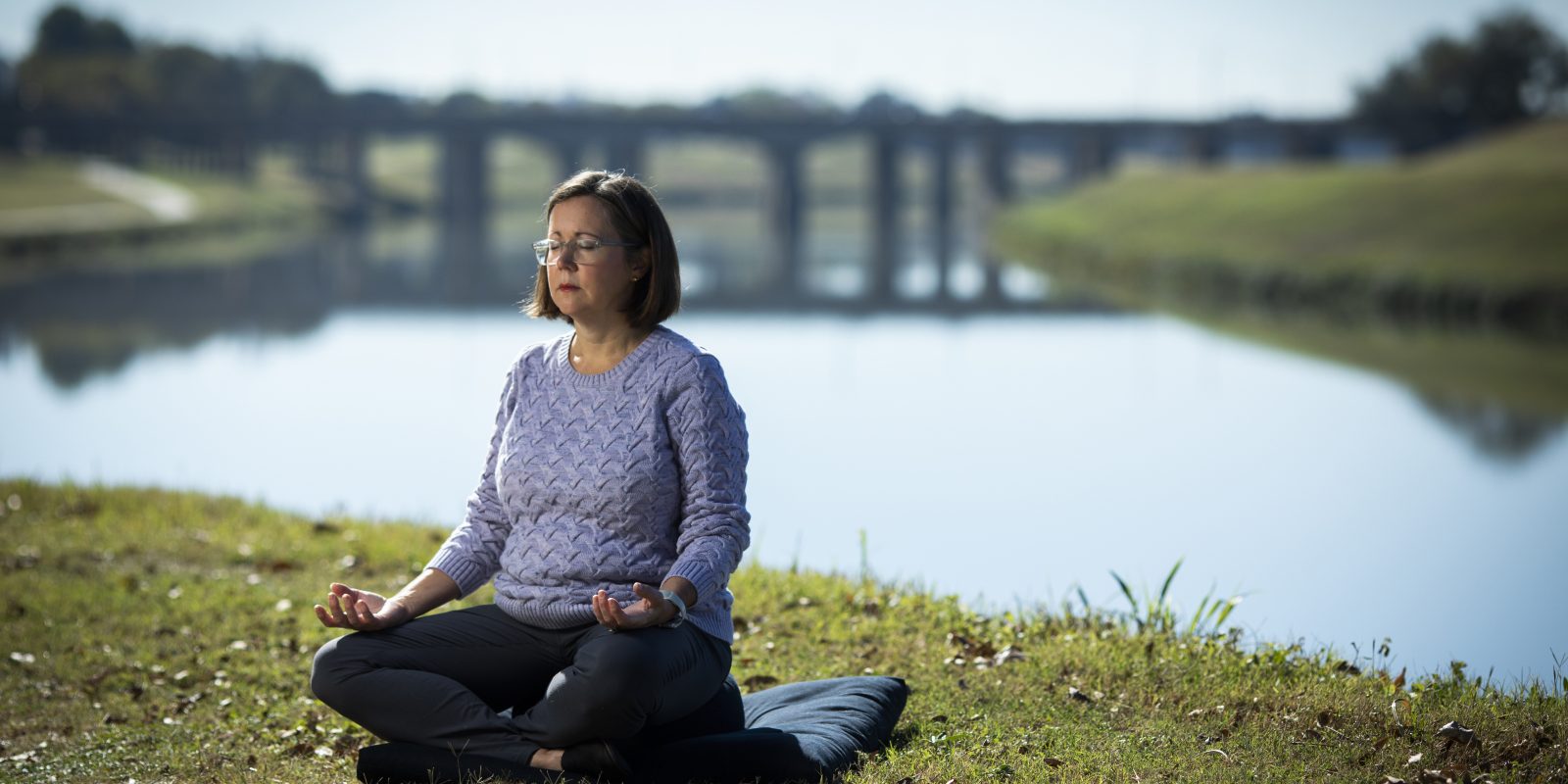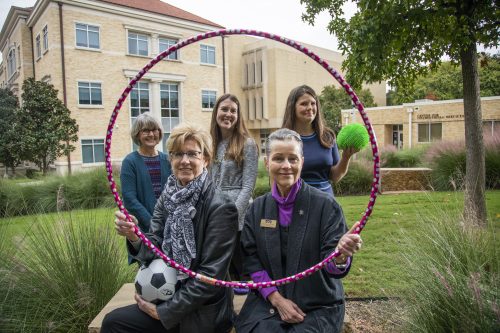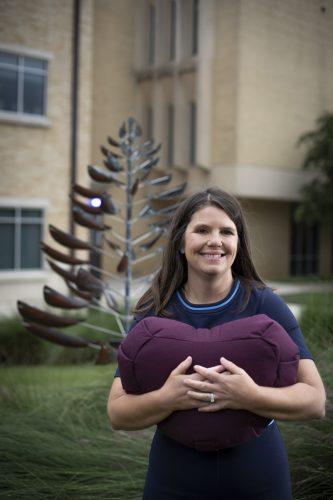
Shirley Martin and fellow Harris College faculty members were instrumental in establishing the Bebout Wellness Center for the Helping Professions to foster wellness practices among nursing students. Photo by Rodger Mallison
Practicing Mindfulness at TCU’s Bebout Wellness Center
Harris College researchers are creating a culture of mindfulness to counteract stress in nursing students.
As a newly out-of-college nurse in an intensive care unit, Katie Lano ’19 knew the job would be demanding. But the TCU graduate, who launched her career in 2019, wasn’t prepared for the fear and stress dealt by the outbreak of a deadly new disease.
“That was something that was hard to adjust to — adjusting to death,” said Lano, who has been on the hospital front line of caring for intubated Covid-19 patients.
Lano said she meditates regularly to deal with on-the-job stressors. She learned the skill as a TCU student in an initiative that became the Bebout Wellness Center for the Helping Professions in the Harris College of Nursing & Health Sciences.
“You’re taking care of people and explaining to them what they need to do to be healthy,” Lano said, “and then the nurse has to practice that as well.”

From left, Ann Johnson, Sharon Canclini, Caitlin Dodd, Pam Frable and Danielle Walker are among Harris College of Nursing & Health Sciences faculty who incorporated stress management techniques involving play and meditation. Photo by Rodger Mallison
TCU nursing faculty members including Danielle Walker ’03, Pam Frable, Shirley Martin, Ann Johnson, Sharon Canclini and Caitlin Dodd ’05 (MS ’10) helped launch the Bebout center in 2020 to foster wellness practices among nursing students. But the initiative began in summer 2018 with four accelerated baccalaureate students who were asked to develop a project that was personal to them and could influence their future practice.
“At the time, we were so overwhelmed with stress that we couldn’t think of anything,” said Annie Tague ’18, who was a student in that class.
Frable, associate professor of nursing, offered them the opportunity to put their proposal for instruction in stress reduction into action in the fall 2018 public health nursing clinical. Since then, every class has built on the previous semester’s work to move the initiative forward.
“From the beginning the initiative has been by the students, for the students with faculty champions, mentors and coaches,” Frable said. “It’s a collaboration between faculty and students, with students being empowered to lead.”
Walker, an assistant professor of nursing who developed an elective exploring mental health through literature, took the lead on securing the grant that launched the Bebout Wellness Center.
“I think that this type of initiative and this type of program needs to be taught to every person because life is stressful.”
Sharon Bebout
Funded by the Bebout Family Foundation, the center seeks to support wellness research and provide weekly programming to promote a culture of health.
Sharon Bebout’s daughter was a nursing student at TCU when she took her own life in 2010. The Bebout Family Foundation has since been involved with TCU nursing, setting up a scholarship and most recently establishing the center.
“I think that this type of initiative and this type of program needs to be taught to every person because life is stressful,” Bebout said. “We’re just so busy all the time, and we just don’t really know how to take care of ourselves necessarily in the best way.”
The center includes the Amanda Bebout Resilience Room, a space for quiet meditation for nursing students in the Annie Richardson Bass Building, the headquarters for TCU Nursing.
“You can think about the center as an umbrella that helps connect multiple wellness initiatives,” Frable said.
It isn’t just the students who need better ways to manage stress. Nurses across the country were overworked before the pandemic erupted. A November 2019 study published in BioMed Central Nursing found that 1 in 3 U.S. nurses reported burnout symptoms, including fatigue and lack of motivation. And the effects of the more demanding protocols, panic and mountains of personal protective equipment that have accompanied the novel coronavirus are yet to be fully known.

Danielle Walker, assistant professor of nursing, says nurse wellness is linked to the quality of patient care. Photo by Rodger Mallison
In a telling finding, nurses who experienced burnout symptoms were more likely to make a mistake than those who didn’t. “Nurse wellness and the quality of patient care is closely linked,” Walker said. “If we expect our students to go out and provide the best, safest care they can, we need to equip them to do that in every way possible.”
Annie Thompson ’20 was in Canclini’s spring 2020 public health clinical, which hosted Hacks and Snacks, an orientation program to ease the nerves of new nursing students.
“Nursing students really put a lot of pressure on themselves and are used to kind of succeeding, and then you get thrown into this crazy college curriculum,” said Thompson, who endured three stomach ulcers from stress as a student.
Two nursing faculty members are collaborating on research to measure stress in nursing students and study how mindfulness affects such tension. Their goal is to create strategies for intervention.
Johnson and Martin, both assistant professors, are studying well-being and mindfulness behaviors in nursing students at TCU, the University of Texas at Arlington and Texas Woman’s University. In addition to assessing the effects of mindfulness workshops, they are measuring stress levels over time via hair cortisol and other psychological tests.
They recently completed a study examining well-being in 417 nursing students. Early findings indicate that students who self-report a mindfulness practice fare better than those who don’t.
“We see that students who had any mindfulness practice, compared to none, tend to be happier, more satisfied with life and less stressed,” Martin said.

Your comments are welcome
1 Comment
This is excellent snd needed not just for nurses but everyone.
Related reading:
Campus News: Alma Matters, Research + Discovery
Treating the student body: A Q&A With Jane Torgerson
How the Brown-Lupton Health Center medical director is steering TCU through the pandemic.
Research + Discovery
A Role Model for Women in Medicine
OB-GYN chair April Bleich prepares future doctors for a lifelong journey with their patients.
Alumni, Features
Barclay Berdan Leads the Covid Vaccination Effort in DFW
The Texas Health Resources CEO is a case study in crisis leadership.